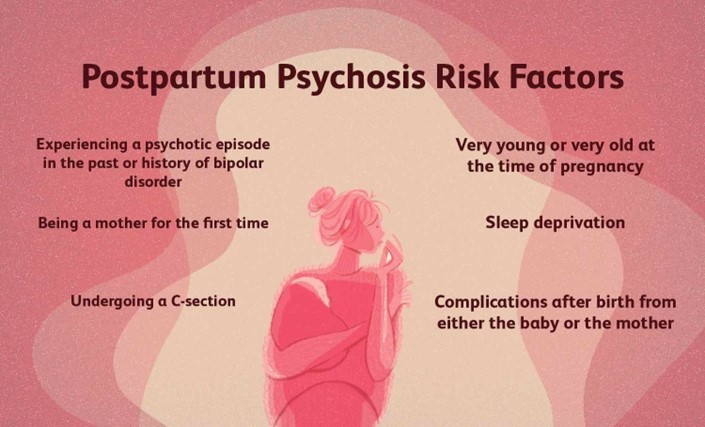A client has been diagnosed with postpartum psychosis. Which of the following actions should the nurse take? Select one:
Maintain the client on strict bedrest.
Carefully monitor intake and output.
Restrict visitation of the client's partner.
Closely supervise all infant care and interaction.
The Correct Answer is D
Choice A Reason: Maintain the client on strict bedrest. This is an inappropriate action that may worsen the client's condition and increase her isolation and depression. Postpartum psychosis requires prompt psychiatric treatment with medication and psychotherapy, not bedrest.
Choice B Reason: Carefully monitor intake and output. This is an irrelevant action that has no direct relation to postpartum psychosis or its management. Monitoring intake and output may be indicated for other postpartum complications such as hemorrhage, infection, or preeclampsia.
Choice C Reason: Restrict visitation of the client's partner. This is an unnecessary action that may deprive the client of social support and emotional comfort. The partner may be an important source of help and information for the client and the health care team. The partner should be involved in the client's care and education, unless there are signs of abuse or violence.
Choice D Reason: Closely supervise all infant care and interaction. This is because postpartum psychosis is a severe mental disorder that occurs in some women after childbirth, which can cause delusions, hallucinations, paranoia, mood swings, confusion, and suicidal or homicidal thoughts. Postpartum psychosis can pose a danger to both the mother and the infant, as the mother may harm herself or the infant due to distorted perceptions or impulses. The nurse should closely supervise all infant care and interaction to ensure safety and prevent injury.

Nursing Test Bank
Naxlex Comprehensive Predictor Exams
Related Questions
Correct Answer is A
Explanation
Choice A Reason: Grunting and nasal flaring. These are signs of respiratory distress in newborns, which indicate that their oxygenation needs are not being met. Grunting and nasal flaring. This is because grunting and nasal flaring are signs of respiratory distress in newborns, which indicate inadequate oxygenation and ventilation. Grunting is a noise made by the newborn when exhaling, which reflects an atempt to keep the alveoli open and increase lung volume.
Nasal flaring is a widening of the nostrils when inhaling, which reflects an effort to reduce airway resistance and increase airflow.
Choice B Reason: Acrocyanosis. This is not a sign of respiratory distress in newborns, but rather a common condition called acrocyanosis. Acrocyanosis means bluish discoloration of the hands and feet due to poor peripheral circulation in response to cold exposure or stress. It does not affect oxygenation or ventilation and usually disappears within 24 to 48 hours after birth.
Choice C Reason: Abdominal breathing. This is not a sign of respiratory distress in newborns, but rather a normal patern of breathing for them. Abdominal breathing means that the newborn's abdomen rises and falls with each breath, which reflects the use of the diaphragm as the primary respiratory muscle.
Choice D Reason: Respiratory rate of 54 breaths/minute. This is not a sign of respiratory distress in newborns, but rather a normal range of respiratory rate for them. A normal respiratory rate for a newborn ranges from 40 to 60 breaths per minute.
Correct Answer is D
Explanation
Choice A Reason: Daily weight. This is an incorrect answer that indicates a valid parameter to assess hydration status. Daily weight is a measure of the body mass that can reflect changes in fluid balance. Daily weight can help detect fluid loss or gain in premature infants, who are more prone to dehydration or overhydration due to immature renal function and high insensible water loss.
Choice B Reason: Consistency of stool. This is an incorrect answer that indicates a valid parameter to assess hydration status. Consistency of stool is a measure of the texture and form of feces that can reflect changes in fluid intake and absorption. Consistency of stool can help identify diarrhea or constipation in premature infants, who are more susceptible to gastrointestinal problems such as necrotizing enterocolitis or feeding intolerance.
Choice C Reason: Volume of urine output. This is an incorrect answer that indicates a valid parameter to assess hydration status. Volume of urine output is a measure of the amount of urine produced and excreted by the kidneys that can reflect changes in fluid balance and renal function. Volume of urine output can help monitor hydration status and kidney function in premature infants, who are more vulnerable to fluid overload or deficit and renal impairment.
Choice D Reason: Blood pH. This is because blood pH is a measure of the acidity or alkalinity of the blood, which reflects the balance between carbon dioxide and bicarbonate in the body. Blood pH is not a direct indicator of hydration status, which refers to the amount of water and electrolytes in the body. Hydration status can affect blood pH, but blood pH can also be influenced by other factors such as respiratory or metabolic disorders.

Whether you are a student looking to ace your exams or a practicing nurse seeking to enhance your expertise , our nursing education contents will empower you with the confidence and competence to make a difference in the lives of patients and become a respected leader in the healthcare field.
Visit Naxlex, invest in your future and unlock endless possibilities with our unparalleled nursing education contents today
Report Wrong Answer on the Current Question
Do you disagree with the answer? If yes, what is your expected answer? Explain.
Kindly be descriptive with the issue you are facing.
